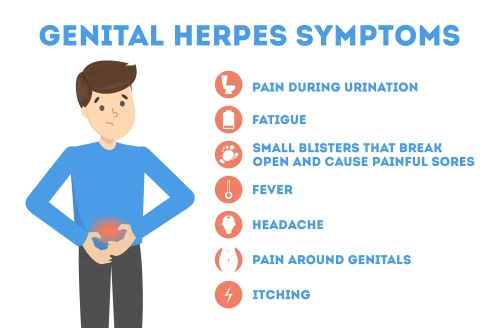Genital Herpes, Sexually transmitted infection, Sores, Herpes simplex virus
Description : Genital herpes is a common infection caused by the herpes simplex virus (HSV) which is transmitted
Article Details :
What is genital herpes?
Genital herpes is a common infection caused by the herpes simplex virus (HSV) which is transmitted through sexual contact. There are two types of HSV namely; HSV-1 and HSV-2. Genital herpes can arise from both types of HSV, however, most cases is caused by the HSV-2 strain.
With time, statistics have shown an increase in the prevalence of the disease. In the United States, one in about five people has the infection, however, most of them may not have any symptoms. Once you have the infection, it remains in your body and may cause recurrent episodes of ulcers. The infection can spread even if you or your partner do not have any symptoms.
It is of utmost important to seek medical care early and start treatment as soon as possible.
What causes genital herpes?
As mentioned earlier, genital herpes is caused by the herpes simplex virus (HSV), most commonly type 2. However, more and more cases of genital herpes due to HSV-1 has been reported nowadays. The virus is transmitted most commonly during oral, anal and vaginal sex. Genital herpes can be transmitted during oral sex if the partner has a cold sore on the lip. You or your partner may still be infected even if no lesions or symptoms are present.
Genital herpes cannot be transmitted after exposure to contaminated surfaces such as toilet seats, bed sheets or door knobs. The transmission is more likely to occur from an infected man to an uninfected woman compared to the transmission from an infected woman to an uninfected man. Your risk of having the infection increases with the number of sexual partners you have as well as how often you have sex.
Pregnant women who have genital herpes can transmit the infection to their newborn during childbirth. Herpes can cause serious infections in newborns, therefore, appropriate precautions should be taken to minimise the risk of transmission. If active lesions are present at the time of labour, a caesarean delivery is warranted.
Having genital herpes also puts you more at risk of having other sexually transmitted infections such as human immunodeficiency virus (HIV).
What are the symptoms of genital herpes?
The symptoms present in genital herpes depends on the stage of the disease. Many people may even not experience any symptoms. The stages of genital herpes are as follows:
- Initial episode: Most of the time, the first outbreak is the most severe episode. It tends to be more severe in women compared to men. Once you have contracted the infection, the first episode may occur a few weeks later. The most common symptom is blisters in the genital area. It can be present on the vagina, vulva, buttocks, anus, thighs, penis and scrotum. The blisters eventually progress to painful ulcerations that later crusts and heals. Other symptoms may include swollen nodes in the groin, fever, headache and painful urination.
- Latent stage: After the initial episode has resolved, the virus migrates to nerves where it remains dormant for some time. During this stage, no symptoms are present.
- Recurrent episodes: When the virus leaves the nerves to go back to the surface of the skin, an outbreak occurs. However, they tend to be milder compared to the initial episode. The symptoms may arise at the same place as the first episode or to other skin areas. With time, the frequency of recurrent episodes becomes less frequent and less severe compared to previous episodes. The following factors may be triggers for recurrence: illness, stress, sunlight, menstrual periods or fatigue.
How is the diagnosis of genital herpes made?
To make the diagnosis of genital herpes, your doctor will start by taking a detailed history from you including your sexual history. Your doctor will then proceed with a physical examination to have a look at any lesions present as well as feeling for any swollen nodes. It is important to have a proper evaluation in order to rule out any other conditions that may mimic genital herpes, for example: syphilis and chancroid.
Most of the time, the diagnosis of genital herpes is made clinically. However, in some cases, other tests may be required to identify which type of HSV is present. These tests include:
- Polymerase chain reaction (PCR) test: This is a test that identifies the presence of herpes virus in your cells and body fluids from your genital tract.
- Culture test: This also helps in identifying the presence of the virus in the active skin lesions.
- Antibodies test: Blood tests may be done to check for the presence of antibodies against HSV-1 or HSV-2.
What is the treatment for genital herpes?
There is no cure for genital herpes, however, treatment options are available to manage the disease and resolve symptoms. Treatment options include:
- Antiviral medications: This is the class of drugs used to treat viral infections. Some examples include acyclovir, famciclovir and valacyclovir. These medications are in the form of pills. They help in decreasing the durations of symptoms. The duration of treatment and dose of the medications depends on whether this is the first outbreak or a recurrence. Usually, for the first outbreak, the antiviral medication should be taken for at least 7 to 10 days. Low dose antivirals may also be taken if you are likely to Read more








